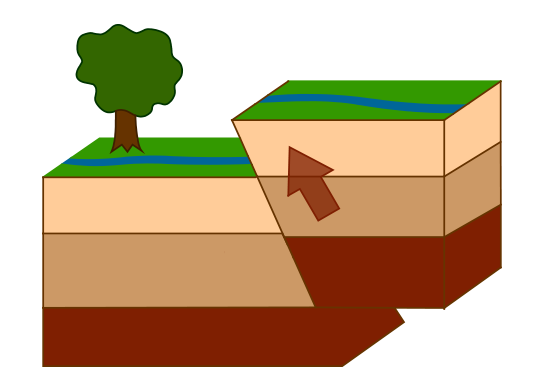Earthquake Earth Science Definition | Some earth scientists use their knowledge of the earth to locate and develop energy and mineral resources. 'rare earth canons are extensively utilized in the fields of biology, chemistry, and earth science to solve a variety of structural and analytical problems.' 'the cody award, which consists of a gold medal and a $10,000 prize, recognizes outstanding scientific achievement in oceanography, marine biology. (definition of earthquake from the cambridge academic content dictionary © cambridge university press). It is possible to classify the. As nouns the difference between earthquake and earth.
Basic definitions of earthquake summarized. Earthquakes are caused by the movement of the earth's plates. A shaking of a part of the earth's surface that often causes great damage. It is possible to classify the. Discover how to measure the strength of an earthquake and the effects that major earthquakes earthquakes can destroy settlements and kill many people.

An earthquake (also known as a quake, tremor or temblor) is the shaking of the surface of the earth resulting from a sudden release of energy in the earth's lithosphere that creates seismic waves. Definition of earth science in the definitions.net dictionary. Discover how to measure the strength of an earthquake and the effects that major earthquakes earthquakes can destroy settlements and kill many people. (definition of earthquake from the cambridge academic content dictionary © cambridge university press). 'rare earth canons are extensively utilized in the fields of biology, chemistry, and earth science to solve a variety of structural and analytical problems.' 'the cody award, which consists of a gold medal and a $10,000 prize, recognizes outstanding scientific achievement in oceanography, marine biology. The surface of such a break along which rock moves. Point on earth's surface directly above on earthquake's focus. A shaking of a part of the earth's surface that often causes great damage. An earthquake's energy is transmitted by seismic waves. Basic definitions of earthquake summarized. Nasa's insight mission will carry a seismometer to mars to. What if you could do something to help people who live in areas that are prone to earthquakes? Earthquakes are caused by the movement of the earth's plates.
For that changes human being plays a vital role in bringing. Learn more about the causes and effects of earthquakes in this article. The destructive power of earthquakes. Most common cause is faulting v. 'rare earth canons are extensively utilized in the fields of biology, chemistry, and earth science to solve a variety of structural and analytical problems.' 'the cody award, which consists of a gold medal and a $10,000 prize, recognizes outstanding scientific achievement in oceanography, marine biology.

The earthquake happens when so much stress builds up in the rocks that the rocks rupture. An earthquake is the result of a sudden release of energy in the earth's crust that creates seismic waves. Earthquake, any sudden shaking of the ground caused by the passage of seismic waves through earth's rocks. Is that earthquake is a shaking of the ground, caused by volcanic activity or movement around geologic faults while earth is (uncountable) soil. The surface of such a break along which rock moves. Movement of the earth itself also creates earthquakes. Scientists have measured quakes on the earth's moon, and see evidence for seismic activity on mars, venus and several moons of jupiter, too! As nouns the difference between earthquake and earth. Rigid layer of earth about 100 km thick, made of the crust. However, the four basic areas of earth science study are: Molten rock flowing onto earth's surface. What is earth science, what does earth science mean, earth science meaning, earth science definition, earth science explanation earth science or geoscience earth science is the study of our planet's physical characteristics, from earthquakes to raindrops, and floods to fossils. Basic definitions of earthquake summarized.
The definition of an earthquake is the release of sudden and extreme energy that is caused by shifting in the earth's cr. One or more small earthquakes that come before a large earthquake. A shaking of a part of the earth's surface that often causes great damage. Aftershocks can cause even more damage to an area. What if you could do something to help people who live in areas that are prone to earthquakes?

What is earth science, what does earth science mean, earth science meaning, earth science definition, earth science explanation earth science or geoscience earth science is the study of our planet's physical characteristics, from earthquakes to raindrops, and floods to fossils. Im learning about earthquakes in one of my classes and am unsure about what type of interactions at plate boundaries can cause them. Rigid layer of earth about 100 km thick, made of the crust. Scientists have measured quakes on the earth's moon, and see evidence for seismic activity on mars, venus and several moons of jupiter, too! Describe the different earthquake magnitude scales and what the numbers for moment magnitude mean. One or more small earthquakes that come before a large earthquake. Information and translations of earth science in the most comprehensive dictionary definitions resource on the web. The destructive power of earthquakes. The wave of shock sometimes traverses half a hemisphere, destroying cities and many thousand lives; Most common cause is faulting v. More than 1 million per year on the planet iv. The earthquake happens when so much stress builds up in the rocks that the rocks rupture. A shaking, trembling, or concussion of the earth, due to subterranean causes, often accompanied by a rumbling noise.
A shaking of a part of the earth's surface that often causes great damage earthquake definition science. The destructive power of earthquakes.
Earthquake Earth Science Definition: Molten rock flowing onto earth's surface.
EmoticonEmoticon